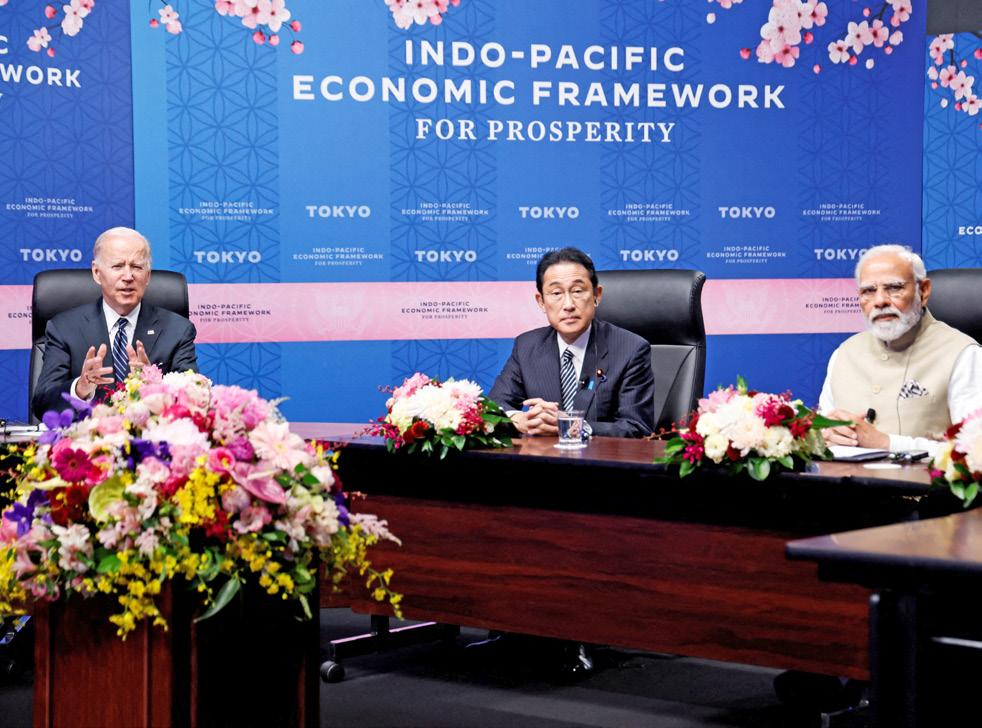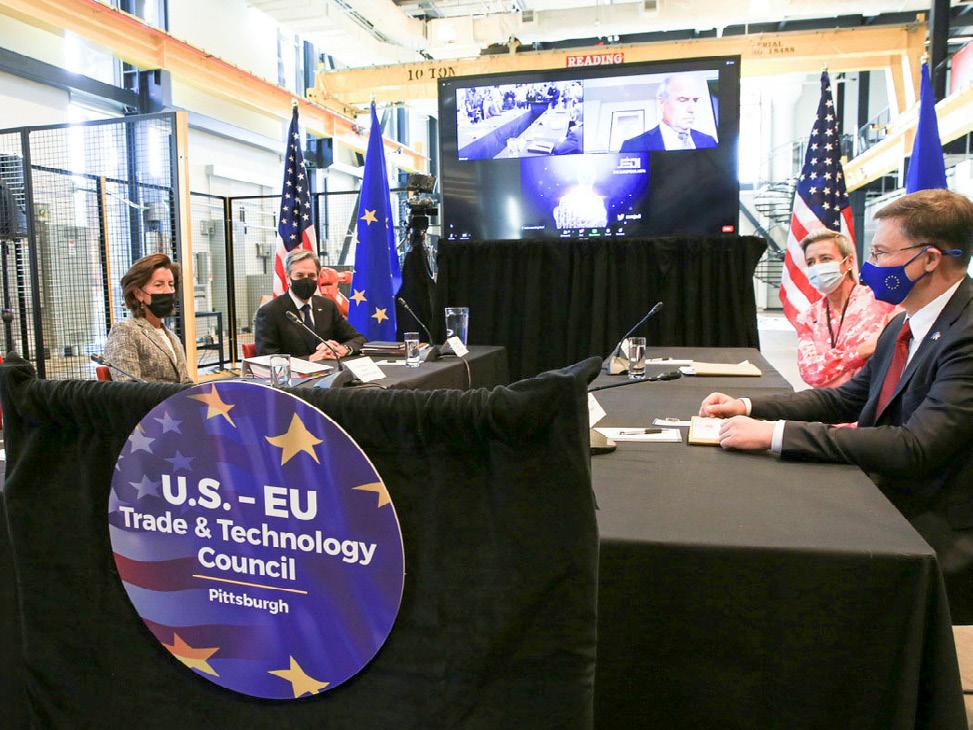
6 minute read
V. PARTICIPATING NATIONS

President Biden launches a new Indo-Pacific Economic Framework in Tokyo, and US officials meet with their European counterparts in the US-EU Trade and Technology Council. (via REUTERS)
At the outset, D-TEP would bring together leading democracies that share strategic concerns over the challenges to the rules-based order posed by China and Russia. This could include the advanced industrialized economies of the G7—the United Kingdom, Canada, France, Germany, Italy, Japan, and the United States—and the D-10, which also includes Australia, South Korea, and the European Union.80 Collectively, these leading democracies constitute nearly 60 percent of the world’s economy, and would represent an influential economic bloc.81
In addition, D-TEP would aspire to include India, Mexico, Brazil, South Africa, Indonesia, and other democracies worldwide that are willing to support the goals of this framework. Bringing in these emerging economies could bolster the legitimacy and impact of this framework. With all of the world’s democracies on board, D-TEP’s share of the global economy would rise to about 70 percent.82 And as noted above, the inclusion of lower-wage economies could also help with the goal of shifting supply chains away from China, as it would provide attractive economic alternatives for firms to relocate manufacturing facilities.
However, many of these nations, with their traditional nonaligned foreign policies, have been reluctant to take sides in what they see as a growing competition among great powers, and may hesitate to participate in a new framework that requires them to circumscribe existing trade relationships with countries on which they are significantly dependent. India, for example, relies heavily on Russia for military equipment, and China remains Indonesia’s largest trading partner. But the economic benefits of participating in D-TEP may help shift the strategic calculus among many of these nations and incentivize them to reduce such ties.
Also requiring careful consideration is whether D-TEP membership should be extended to nondemocratic, but increasingly significant, economic partners such as Vietnam. On the one hand, it would be beneficial to include all free-market nations—democratic or not—that are willing to join in common efforts to constrain China and/or Russia, as provided by this framework. On the other hand, for D-TEP to succeed, critical supply chains must be relocated to nations that are stable, reliable, and trusted— and the most stable and trusted partners are those that are committed to democracy and the rule of law. If these supply chains simply end up moving from one set of autocracies to another, that may not serve the intended purpose, as it would expose these supply chains to new vulnerabilities stemming from domestic political instability and international human rights sanctions. More broadly,
80 The D-10, in its current manifestation in the form of the Atlantic Council’s D-10 Strategy Forum, includes these ten participants. India was also included in Prime Minister Boris Johnson’s attempts to formalize a D-10 in 2021. 81 Ash Jain and Matthew Kroenig, “From the G7 to a D10: Strengthening Democratic Cooperation for Today’s Challenges,” Atlantic Council, June 1, 2021, https://www.atlanticcouncil.org/wp-content/uploads/2021/06/From-the-G7-to-a-D10-Strengthening-Democratic-Cooperation-for-Todays-Challenges.pdf. 82 Ash Jain and Matthew Kroenig, “An Alliance of Democracies: From Concept to Reality in an Era of Strategic
Competition,” Atlantic Council, December 7, 2021, https://www.atlanticcouncil.org/wp-content/uploads/2021/12/
An-Alliance-of-Democracies-From-concept-to-reality-in-an-era-of-strategic-competition.pdf.
there is a compelling economic and strategic rationale for keeping critical supply chains grounded within democracies that share common interests and values, and are committed to upholding the rules-based order, particularly in the context of the current systemic competition between democracy and autocracy.
Still, completely shutting out nations that are unfree or unwilling to commit to all of the actions required under this framework could prove counterproductive, as it would risk ceding economic influence to China and Russia. These considerations suggest that D-TEP may benefit from a two-tiered membership structure that focuses on committed democracies, but provides an avenue for association with others as well, provided they meet certain criteria:
• DTEP allies, or full members, would consist of nations that meet two basic criteria. First, they must be freemarket democracies committed to the rule of law.
This would include nations whose economies are premised on open markets and transparency, and whose governments are democratically elected and committed to protecting human rights and the rule of law.83 Second, they must be willing to commit to the full scope of obligations required under D-TEP, including the measures aimed at regulating trade with both
China and Russia. Nations that meet these criteria would be considered full members and would gain the full slate of benefits described above.
• DTEP associates would consist of other nations that do not meet both of these criteria, but are broadly supportive of D-TEP’s goals. Associates would need to be free-market economies, and must be willing to make a sufficient level of commitment to regulating trade with China and Russia, though they may not embrace the full scope of this framework. D-TEP associates, which could include democratic and non-democratic partners, would gain partial access to the supply chain reorchestration benefits under Pillar One, as well as a subset of benefits under each of the other pillars. Such a two-tiered approach could be useful as a means to consolidate support among democracies committed to implementing the full scope of this framework, while providing a docking mechanism to bring in others that are generally supportive, but not yet willing to make all of the required commitments. D-TEP allies would serve as the foundation of an economic alliance of democratic nations united in pursuing common goals, while D-TEP associate status would help create a wider network of partners working to bolster supply chain resiliency.84
Maintaining the distinction between these two types of participation is important, because it provides an aspirational pathway for nations not yet fully committed to take the actions necessary to achieve full membership over time. It will also be critical to ensure that the benefits available to D-TEP associates are narrowly tailored, and commensurate with the limited scope of commitments they are willing to take on. For D-TEP to achieve its goals, the benefits of ally status must be significantly more robust than those accorded by associate status, so that they can serve as meaningful inducements toward achieving full membership.
In addition to the leading democracies of the D-10, most of the thirty-eight member states of the Organisation for Economic Co-operation and Development (OECD), including small and middle-power democracies across Europe and parts of Latin America, would likely qualify for membership as D-TEP allies. Taiwan might also be invited as a full member.85 Every effort should also be made to bring in rising democracies, including India and Mexico, as full or associate members.
At the same time, the success of this partnership will not be determined by how many nations end up joining. Rather, it will depend on having the full commitment of the world’s largest democratic economies. If it can facilitate agreement among the G7 or D-10 across its four pillars, D-TEP would go a long way toward achieving its goals, and would have a significant impact on protecting the rules-based economic order.
83 Several credible indices can be relied upon to determine which nations meet this criteria, including, for example, Freedom House’s
Freedom in the World. “Freedom in the World,” Freedom House, https://freedomhouse.org/report/freedom-world. 84 See remarks by Liz Truss, suggesting that the democratic world should be open to striking trade deals with countries that do not share its approach to domestic political governance, providing these countries are not trying to undermine liberal democracies, their shared institutions, or international law and order. https://chathamhouse.soutron.net/Portal/Default/en-GB/RecordView/Index/190734 85 Taiwan is a full member of Asia-Pacific Economic Cooperation (APEC).








